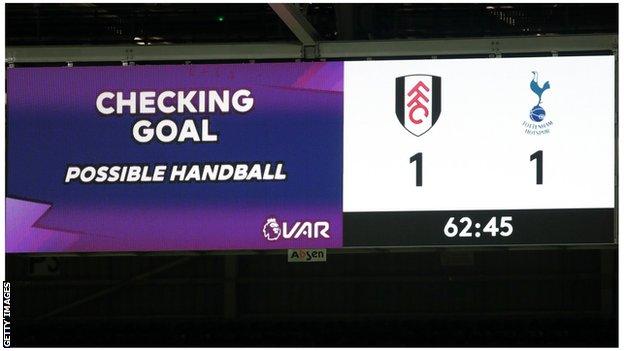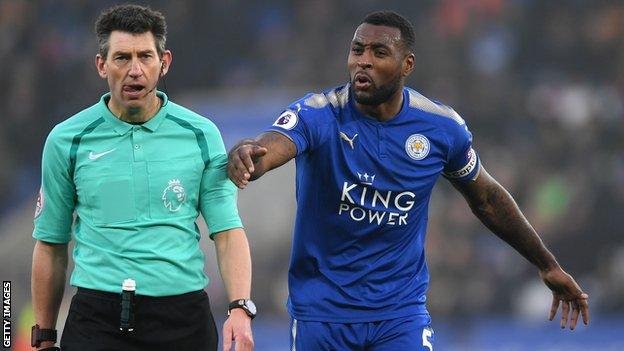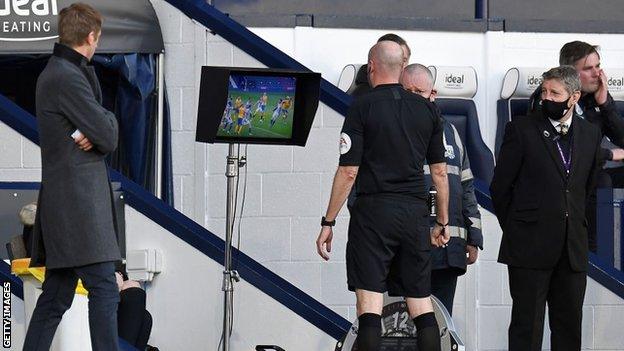Handball, VAR & the 'Match of the Day mistake' - by former referee Lee Probert
- Published

The handball laws were tightened at the start of the 2020-21 season but will now be changed from 1 July
Lee Probert spent more than 20 years as a referee and took charge of the 2014 FA Cup final. He officiated in the Premier League from 2007 until he retired on medical grounds in 2019.
With debate continuing about the standard of officiating in the Premier League, Probert talks about the handball rule, VAR and the fear of watching back a mistake on Match of the Day in a column for BBC Sport.
'That's how daft the handball law is'
Handball is a minefield. It always has been. There have been problems with the rules and as we saw in Fulham's defeat to Tottenham on Thursday, plenty of controversy.
Fulham's Mario Lemina had no chance of avoiding Davinson Sanchez's attempted clearance so it was no wonder Cottagers' boss Scott Parker was angry to see Josh Maja's 'goal' chalked off.
It didn't matter that Lemina's hand was down by his side or that it was unintentional. The rules as they stood on Thursday meant it could not be allowed because the ball struck a hand or arm in the build up.
Curiously, though, a defender would not expect to concede a penalty in the same circumstances.
That's how daft the law is and why football's law makers - the International Football Association Board - announced changes on Friday to return to something that officials and football can understand for next season.
It comes too late for Fulham, but common sense seems like it is going to be applied at last.
'It's an absolute mess' - Shearer and Murphy on Man Utd penalty row
'VAR isn't ruining football'
Managers, players and pundits have criticised VAR for its impact on the game, while in a poll for BBC Sport, only a third of football fans across the UK said they believe VAR has made football better.
I've always found bad decisions arrived in waves but at the moment we seem to be discussing refereeing decisions every week. People say VAR is ruining football, but it isn't. Things like offside are factual. They are black-and-white decisions.
The problem is some things are open to different interpretations. If you have no clear definition of what constitutes a handball, you're going to get different decisions from week to week.
And when you add that to the fact there is a game nearly every night at the moment, it becomes an increasingly difficult job.
The current schedule does not allow for much recovery time so fatigue, injuries and mental tiredness all come into play for both players and officials.
It's not like in normal times and officials are the same as everyone else in the public. They are not getting together as normal and when you are off you're stuck at home and mentally tired and weary from the pandemic.
I've seen former referees and pundits questioning the competency of current officials, which is sad and disappointing.

Lee Probert took charge of 30 games in his final season as a referee in 2018-19
Standards and fitness levels have improved but at the moment it's a transition period and they are easy targets.
Everyone has got a howler in them, we all know that. When it happens it is normally going to be a big talking point but referees are only human. Having said that, good referees make minimal mistakes.
There is always this suggestion that referees should be able to apply common sense but there has never been a 'common sense' law. Players just want to be able to talk to the referee, know they have an empathy for the game and understand where they are coming from.
The fear of watching a mistake on Match of the Day
Manchester United felt aggrieved not to receive a penalty in their 0-0 draw at Chelsea last Sunday, with referee Stuart Attwell dismissing an appeal for handball against Callum Hudson-Odoi after he was instructed to consult a pitchside monitor by the video assistant referee.
I've been in this position plenty of times. Two players (Mason Greenwood and Callum Hudson-Odoi) come together and you can't really see what's happened.
It's something we used to refer to as the 'Match of the Day mistake', where you only know it's a penalty after driving home and watching the highlights.
However, in this instance the law - which says 'deliberately touches the ball with the hand or the arm, moving towards the ball' - and VAR should come to the rescue as it tells the referee it is something he has missed and needs to look at.
I didn't understand why the penalty was not given because Hudson-Odoi's hand moves towards the ball - but the on-pitch referee is the decision maker and it is their interpretation.
At least it's a step away from earlier in the season, when ridiculous decisions were being given.
The penalties awarded against Tottenham's Eric Dier and Crystal Palace defender Joel Ward were never handball in a million years and that's why the Premier League lobbied Ifab for changes early on.
Confusion at the Hawthorns

Lee Mason spoke with Brighton boss Graham Potter and West Brom's Sam Allardyce to explain what was going on while checking VAR
Brighton thought they had equalised at West Brom last Saturday but saw Lewis Dunk's quick free-kick ruled out after referee Lee Mason had blown his whistle twice and consulted VAR.
Both managers and sets of players appeared confused in this game but it had nothing to do with VAR, or interpreting the rules. It was a situation where you want the referee Lee Mason to take more control.
The restart happens to be a Brighton free-kick so it comes down to being on the scene and good organisation. If you allow Lewis Dunk to take it quickly and he puts it wide or over the bar that's his problem.
The sad thing is the referee blows his whistle a second time before the ball cross the goal line. That starts the protocol for VAR to check the goal and the rules say it can't stand.
It's not VAR's fault. The video assistant referee has retrieved the situation because the management of the free-kick was not as good as it should have been.
Lee Probert was speaking to BBC Sport's Steve Sutcliffe.

Supporting your immune system: Can eating certain foods help?
Radio 1's Screen Time: Daniel Radcliffe on his tense new prison-break thriller
